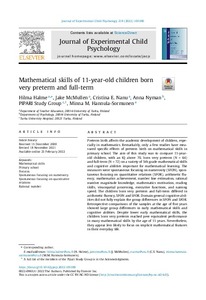Mathematical skills of 11-year-old children born very preterm and full-term
Halme Hilma; McMullen Jake; Nanu Christina E; Nyman Anna; Hannula-Sormunen Minna M
https://urn.fi/URN:NBN:fi-fe2022081154686
Tiivistelmä
Preterm birth affects the academic development of children, especially in mathematics. Remarkably, only a few studies have measured specific effects of preterm birth on mathematical skills in primary school. The aim of this study was to compare 11-year-old children, with an IQ above 70, born very preterm (N = 64) and full-term (N = 72) on a variety of 5th grade mathematical skills and cognitive abilities important for mathematical learning. The measures were spontaneous focusing on numerosity (SFON), spontaneous focusing on quantitative relations (SFOR), arithmetic fluency, mathematics achievement, number line estimation, rational number magnitude knowledge, mathematics motivation, reading skills, visuospatial processing, executive functions, and naming speed. The children born very preterm and full-term differed in arithmetic fluency, SFON and SFOR. Domain general cognitive abilities did not fully explain the group differences in SFON and SFOR. Retrospective comparisons of the samples at the age of five years showed large group differences in early mathematical skills and cognitive abilities. Despite lower early mathematical skills, the children born very preterm reached peer equivalent performance in many mathematical skills by the age of 11 years. Nevertheless, they appear less likely to focus on implicit mathematical features in their everyday life.
Kokoelmat
- Rinnakkaistallenteet [29337]
